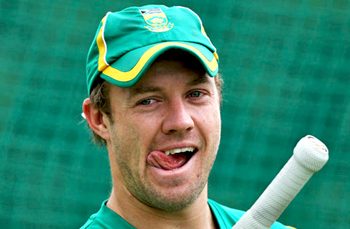Feb 5: South Africa’s hopes of ending a World Cup hoodoo will rest with some of the finest players currently active in the one-day game.
Captain AB de Villiers is the top ranked one-day international batsman and will arrive at the tournament after displaying dazzling form in a series against the West Indies, including the fastest one-day international century, made off a scarcely credible 31 balls.
Not far behind him is Hashim Amla, who has reached a succession of milestones in fewer innings than anyone else -- 2,000, 3,000, 4,000 and most recently 5,000 runs.
As an opening batsman in one-day cricket, Amla sets the tone for many an innings.
Both De Villiers and Amla have career batting averages in excess of 50 and their runs have been scored at a rapid rate -- De Villiers with a strike rate of close to 100 and Amla at just under 90.
Amla will be partnered at the top of the order by the prodigious talent of wicketkeeper Quinton de Kock, provided the 22-year-old left-hander has fully recovered from an ankle injury.
And there are other good batsmen, too, with Faf du Plessis, David Miller, who hit his maiden one-day century against the West Indies in the recently concluded series, and JP Duminy all having shown their class at international level.
In Dale Steyn and Morne Morkel, South Africa have two of the most potent fast bowlers in the world game, while new ball bowler Vernon Philander is an accurate exploiter of any life in a pitch.
Leg-spinner Imran Tahir made his debut at the 2011 World Cup and was one of the tournament's leading wicket-takers. He has continued to pick up regular wickets and is among the all-time top ten in terms of strike rate.
The bowlers can look forward to being packed up by energetic fielders who in recent times have taken almost all the chances that come their way.
Unusually, though, South Africa do not possess all-rounders of the quality that has been a hallmark of their teams since their first appearance in a World Cup in 1992.
Duminy is a capable off-spinner but only bowled a full 10 overs in four of his first 132 one-day internationals.
South Africa have therefore had to decide whether to load their batting or their bowling.
They appear to have settled on a formula of seven batsmen and four specialist bowlers, with Duminy and medium-pacer Farhaan Behardien -- who has yet to establish himself fully at international level -- sharing the role of the fifth bowler.
It could be a risky strategy, especially if one of the four main bowlers has a bad day -- as was the case for both Philander and Morkel on occasions during South Africa's one-day tour of Australia late last year. That will put pressure on the other leading bowlers and particularly on the part-timers.
If their specialist batsmen and bowlers hit their best form, South Africa will be serious contenders for the world crown although "death" bowling remains a problem.
The big imponderable, though, is the ability of South Africa to respond in pressure situations.
They have been criticised in the past for lacking tactical flexibility, while they will have to overcome the mental hurdle of never having won a knockout match in a major ICC tournament.
SA factfile
Squad: AB de Villiers (capt), Kyle Abbott, Hashim Amla, Farhaan Behardien, Quinton de Kock, JP Duminy, Faf du Plessis, Imran Tahir, David Miller, Morne Morkel, Wayne Parnell, Aaron Phangiso, Vernon Philander, Rilee Rossouw, Dale Steyn
Coach: Russell Domingo
Fixtures — Pool B
Feb 15: Zimbabwe, Hamilton
Feb 22: India, Melbourne
Feb 27: West Indies, Sydney
March 3: Ireland, Canberra
March 7: Pakistan, Auckland
March 12: United Arab Emirates, Wellington
World Cup record:
1992: Semifinals
1996: Quarterfinals
1999: Semifinals
2003: Pool stage
2007: Semifinals
2011: Quarterfinals
Key player:
AB de Villiers: De Villiers will go into the World Cup as the world's number one ranked one-day international batsman. South Africa's ODI?captain underlined his outrageous ability when he broke the world record for the fastest century, reaching the mark off 31 balls on the way to scoring 149 off 44 deliveries against the West Indies in January.
On song, De Villiers has the ability to destroy the best bowling attacks with strokes that most other batsmen would not even attempt. But he is also able to adapt his game to circumstances and if necessary can bat with a tight defence in a crisis situation.






Comments
Add new comment